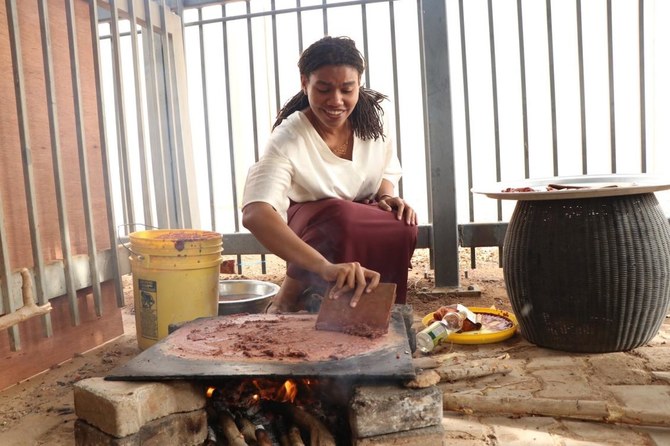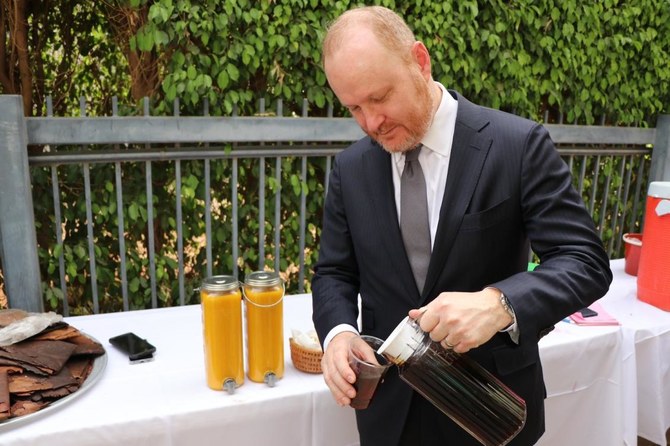OM ESHR, Sudan: As generations of Sudanese have done before her, Wissal Abdel Ghany crouched next to a fire to prepare a traditional drink, a thirst-quenching favorite enjoyed during the fasting month of Ramadan.
In Sudan, the arduously made “helo-murr,” which means “bittersweet,” is a drink synonymous with the Islamic holy month.
It can be found on almost every table across the northeast African country at the end of the day’s fast.
“Without it, our table feels empty,” said Abdel Ghany, wearing a bright orange headscarf.
She sat in a small room in the village of Om Eshr, on the outskirts of the capital Khartoum, which teemed with a small force of women busily scraping and spreading a mixture before serving the beverage in clear glasses.
The drink has satisfied thirsty fasters for decades and recipes are “inherited from our mothers and grandmothers,” the 43-year-old said.
Corn is harvested and left to dry in the sun before being ground and mixed with spices such as fenugreek, cumin or even hibiscus — Sudan’s other essential Ramadan beverage.
This mixture is then soaked in sugar and water for several days.
Abdel Ghany spread a layer of the thick brown paste over a grill plate above the coals of a wood fire, cooking it into a thin, leather-colored film.
The resulting crepe-like layer is then peeled away and stored — ready to be soaked in the final step to create the beloved drink.
Served as cold as possible, the drink is one of many ways that fasting Sudanese cool off, a significant challenge in one of the world’s hottest countries.
The daytime fasting month of Ramadan is one of the five pillars of Islam.
Observant Muslims refrain from eating and drinking from dawn to dusk, after which they traditionally gather with family and friends to break their fast.
In Sudan, the brew is so identified with Ramadan that even the US embassy took to Twitter to promote its staff making it, with diplomats wielding wooden spoons over embers and sipping the amber liquid.
Abdel Ghany said preparing the drink is a collective effort, bringing “together our sisters and friends.”
“We make it together to share among ourselves,” she said.
In Sudan’s cities, she added, some people don’t make it themselves.
“But they still have to offer it for dinner, so they buy it ready-made,” she said.
For Abdel Ghany, the preparation of helo-murr and the holy month cannot be separated.
“All it takes is a whiff of the scent coming out of a home to know that Ramadan is here,” she said.
Sudan’s speciality ‘bittersweet’ Ramadan drink
https://arab.news/z56d7
Sudan’s speciality ‘bittersweet’ Ramadan drink

- In Sudan, the arduously made “helo-murr,” which means “bittersweet,” is a drink synonymous with Ramadan
- It can be found on almost every table across the northeast African country at the end of the day’s fast
Where We Are Going Today: The Terrace in Jeddah

- Desserts at The Terrace follow classic lines, with options like profiteroles, cardamom creme brulee, tiramisu and pavlova
The Terrace by The Good Butcher, overseen by food entrepreneur and chef Basma El-Khereiji, is a new seaside spot that combines casual dining with live music and pop-up events.
Located next to Movenpick Jeddah Al-Nawras in Ash Shati, the setting offers an open view of the water, making it a relaxed place to spend an afternoon or evening.
The menu focuses heavily on burgers, with options ranging from the double and triple smashed cheeseburgers, to the more elaborate truffle and wagyu burgers.
I tried a selection of the smashed burgers and found the beef to be well cooked and the seasoning balanced, though the triple cheeseburger felt slightly heavy with all the toppings combined.
The crispy chicken burger and chicken Caesar burger provided alternatives to red meat, with straightforward preparation and familiar flavors. Sides such as parmesan and truffle fries, paired with sauces like cheddar, BBQ and truffle mayo, complemented the mains.
Desserts at The Terrace follow classic lines, with options like profiteroles, cardamom creme brulee, tiramisu and pavlova. I tried the cardamom creme brulee and the pavlova. The creme brulee had a smooth, creamy texture, with a delicate hint of cardamom that was noticeable, and the caramelized top added a satisfying contrast.
The pavlova offered crisp meringue with a soft interior, paired with a light mascarpone cream and fresh berries, providing a mix of textures in each bite. Both desserts were consistent with their descriptions and well prepared.
One of the standout options on the beverage menu is the spicy bull heart, a tomato-based drink that combines tomato juice with lemon, Tabasco, Worcestershire sauce, and a touch of salt and pepper.
The menu also includes gin and tonics with a choice of tonics, as well as signature cocktails like wooden smoke house and sunny land, each bringing a unique combination of ingredients and infusions.
The beverage menu introduces new and unexpected flavors, encouraging guests to explore and try something they may never have tasted before, all while enjoying the seaside setting and relaxed ambiance.
Check @theterrace.sa for more information.















